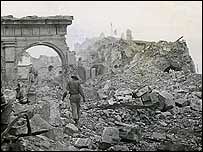People have a tendency to overdramatize the War on Terror, not because it's not dramatic and tragic in many ways, but because they don't have anything to compare it to, and expect life to be easier and more pleasant than it historically has been for most people. The story of the Monastery of Monte Cassino is the kind that brings Iraq and Afghanistan into sharper focus.
An author* once referred to the Order of Benedictine Monks, established in the Sixth Century by Saint Benedict in Cassino, Italy, as having "set in motion one of the great civilizing movements in human history." The massive and fortified Monastery of Monte Cassino sits above in a perfect spot to observe all of the valley below, which is where Allied forces were bound to come on their way to Rome. There was an ugly battle there, taking far too much time and far too many lives, and during that battle, the decision was made to destroy the monastery. Air Force heavy and medium bombers levelled the monastery on February 15th, 1944, the fourth time it had suffered that fate.
I've been reading
The Battle of Cassino by Fred Majdalany, who fought in the battle as an infantry officer. He's a good writer and has a nice grasp of the issues surrounding
Cassino,
Anzio, the
Rapido River crossing, and some of the other difficult bits of Allied battle history from the largely ignored Italian theater during WWII. People are still mad about some of this stuff, and I've always wanted to understand it more fully.
So far it's a pretty grim book, with the 34th and 36th Infantry Divisions taking brutal maulings right out of the gate crossing the Rapido in mid-January 1944 (Majdalany refers bitterly to the tragicomedy of landsmen being asked to maneuver boats in a difficult river under fire, which seems to be a recurring theme in WWII memoirs), and the 4th Indian Division and 2nd New Zealand Corps are being butchered in the chapter I'm on now. Weather is miserable, digging in an impossibility in some locations. Supply is a disaster: everything must be packed in by man or mule, under fire most of the way. One unit makes it to their holes with everything but their grenades and spare ammunition, which pretty much sentences many of them to death. And every single one of the soldiers on the Allied side speaks in revulsion of the feeling of the goddamn Monastery looking down on them the whole time.
After being in combat for a while, one begins to pay attention to places that might hide a man with a rifle, or worse, a radio. Church steeples and other tall structures are routinely blown to pieces just to deny the enemy such a vantage point. As Majdalany says, you fight from one good observation point to the next. Overlooking the entire approach and built to withstand serious attack, the Monastery is a natural place to put artillery observers and reinforcements. The decision is made to reduce it with heavy bombers.
There's a lot of disagreement on whether or not it was necessary, or even helpful. One could successfully argue against both. But I personally believe it was one of those godawful necessities of war that make it so senseless and disgusting. I don't think that the Allied commanders would have done otherwise even if they had known the Germans weren't keeping men inside it. It was tragic and a bit morally suspect but that was the deal so it was done, which is the story of much of WWII. People endured the unendurable because they had to.
The story of the Battle of Cassino is one of great tragedy for the order of monks who still inhabit the Monastery, but they draw inspiration from one part of the tale. Unlike the rest of the enormous, fortress-like monastery, neither the cell where founder
St. Benedict spent most of his life nor his crypt were disturbed by the bombings and artillery assaults, even though an unexploded American artillery shell was discovered two feet from the crypt many years after the war. I'd like to think that gave the surviving monks some kind of comfort. Imagine spending your days, months and years in near-constant silence, prayer and contemplation, and then WWII comes through town and kills most of the people you know. Nice to have a miracle to hold on to when your faith is tested so thoroughly. And it's nice to realize that however worried you may be about the future, it wasn't always peaches and cream back in the good old days, and the likelihood that you will suffer as so many millions did in the 20th Century is pretty small.
* Just realized the author is none other than Fred Majdalany. Quelle coincidence . . .



